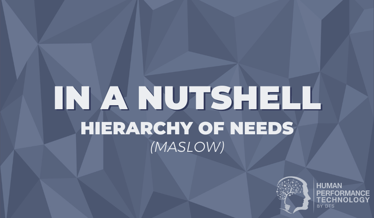Praise & Criticism: Hierarchy of Needs (Maslow)
Abraham Maslow (1908-1970) was an American professor of psychology who played a major role in laying the theoretical foundations of the "humanistic psychology" movement that emerged in mid-20th century.
This article is an extension to our "In a Nutshell" series. To read our original overview of Maslow's Hierarchy of Needs click here.
Praise
Maslow’s hierarchy is simple, orderly, intuitive, widely known and considered to be of great practical value; these are perhaps its greatest strengths. The relatively straightforward progression from basic survival needs to higher-level growth needs is an idea that many people find to be relatable to their life experiences. Because these needs are considered to be innate, universal, and will tend to powerfully influence the behaviours of the majority of human beings, it becomes a model that is both useful and applicable to an enormous range of settings.
Maslow’s hierarchy has been particularly successful in business. Managers can extrapolate insights to identify employees’ needs and tailor their management approach and reward structure to improve satisfaction and engagement. (For example, recognising that a person may struggle to engage at work if they are concerned about fitting in with their peers.)
The model is also acknowledged for being an original, breakthrough idea in the context of its time, which went on to influence many other prominent thinkers. The fact that many psychological concepts and theories that were prominent during the early to mid 1900s have now been discarded, while Maslow’s hierarchy remains, is credit to Maslow’s prescience.
Despite the theory having origins in the 1940s, Maslow’s hierarchy has not diminished in relevance. With each year that passes, there seems to be more appreciation in business around the mutual benefits, to both employers and employees, of providing a work environment that stimulates, nurtures and supports people’s higher-level needs.
Criticism
Perhaps the most significant criticism of Maslow’s hierarchy concerns his unscientific approach, use of unreliable samples, and the specific research methods he used to draw conclusions: namely, personal observation and biographical analysis. That is to say, Maslow’s theory of human motivation was not based on any credible empirical research.
In general, there is partial to little or no evidence from the scientific community as to the validity of Maslow’s hierarchy. One of the most frequently cited reviews comes from Wahba and Bridwell (1976), who reviewed studies based on Maslow’s theory and stated: ‘The literature review shows that Maslow’s Need Hierarchy Theory has received little clear or consistent support from the available research findings. Some of Maslow’s propositions are totally rejected, while others receive mixed and questionable support at best.’ The authors also noted that the theory ‘is almost nontestable’ because Maslow did not provide clear, standard definitions of each need construct, but mainly because it is very difficult to measure the relative satisfaction of needs and the precise extent to which a need must be satisfied before the next emerges, or even what a need is (whether it was psychological and/or physiological). These issues still pose a significant challenge for current researchers.
Another important criticism of Maslow’s methodology relates to ethnocentric bias—an almost exclusive emphasis on Americans (mostly educated, intelligent, male) in the context of a highly individualistic culture. Many of the higher-level needs in the hierarchy focus on the self (achievement, self-esteem, personal growth), which cannot necessarily be globalised and easily transferred to Eastern cultures, for instance, that place greater emphasis on community, selflessness and contribution. It is also not clear whether needs may differ according to gender or socioeconomic background.
Another major criticism is the appearance of a large number of exceptions to the hierarchy. Maslow acknowledged this point, describing ‘reversals’ in the hierarchy: ‘There are some people in whom, for instance, self-esteem seems to be more important than love.’ Maslow observed people in whom certain needs appeared diminished or ‘deadened’ due to lack of exposure (for example, absence of love and connection in childhood), and others who would remain comfortable at a certain level and never progress any further. One of Maslow’s key reflections had to do with creative individuals such as artists who appeared totally preoccupied with self-actualisation while ignoring other needs.
Remember, Maslow’s theory suggests that our needs are arranged in a hierarchy of prepotency, which means that the lowest need exerts the strongest influence when it is not satisfied. He wrote: ‘For the man who is extremely and dangerously hungry, no other interests exist but food. He dreams food, he remembers food, he thinks about food, he emotes only about food, he perceives only food and he wants only food.’ Yet, there are many obvious cases of individuals whose primary interest is in painting or meditating all day long and they appear happy and fulfilled without having other basic needs fulfilled. The fact that Maslow noted these exceptions does not adequately account for them.
In a study published in 2011, researchers from the University of Illinois examined the association between need fulfilment and subjective well-being (SWB) across 123 countries, finding that many of the needs Maslow described appeared to be universal, but the order in which these needs are met had little impact on people's satisfaction with life. In other words, higher-level needs like autonomy, social support, and feeling respected were still important despite the fact that lower-level needs were not being fulfilled.
This article is an abridged version of a chapter from the book our company published called "40 Must-Know Models for People Leaders" researched and written by Theo Winter.
The model explanation, praise and criticism of Maslow was compiled based on our real-world business experience, a review of various literature including books, as well as academic papers.
This is the list of references from the bibliography specific to Maslow:
- Butler-Bowden, Tom. ‘50 Self-Help Classics’, 2003.
- Goble, Frank G. ‘The Third Force: The Psychology of Abraham Maslow’, 2004.
- Hergenhahn, B.R. and Olson, Matthew H. ‘An Introduction to Theories of Personality’, 6th Edition, 2003.
- Hoffman, Edward. ‘The Right to be Human: A Biography of Abraham Maslow’, 1988.
- Hoffman, Edward, with Stephens, Deborah C. & Heil, Gary. ‘Maslow on Management’, 1998.
- Kalat, James. ‘Introduction to Psychology’, 2010.
- Koltko-Rivera, Mark E. ‘Rediscovering the Later Version of Maslow’s Hierarchy of Needs: Self-Transcendence and Opportunities for Theory, Research, and Unification’, 2006.
- Maslow, Abraham. ‘A Theory of Human Motivation’, 1943.
- Maslow, Abraham. ‘Abraham H. Maslow: Books, Articles, Audio/Visual, & His Personal Papers’. http://maslow.com.
- Maslow, Abraham. ‘Motivation and Personality’, 1954.
- Maslow, Abraham. ‘Toward a Psychology of Being’, 1962.
- Schultz, Duane & Schultz, Sydney. ‘Theories of Personality’, 2012.
- Tay, Louis & Diener, Ed. ‘Needs and Subjective Well-Being Around the World’. Journal of Personality and Social Psychology, 2011.
- Wahba, Mahmoud A. & Bridwell, Lawrence G. ‘Maslow Reconsidered: A Review of Research of the Need Hierarchy Theory, Organisational Behavior and Human Performance’, 1976.

Theo Winter
Client Services Manager, Writer & Researcher. Theo is one of the youngest professionals in the world to earn an accreditation in TTI Success Insight's suite of psychometric assessments. For more than a decade, he worked with hundreds of HR, L&D and OD professionals and consultants to improve engagement, performance and emotional intelligence of leaders and their teams. He authored the book "40 Must-Know Business Models for People Leaders."




We Would Like to Hear From You (14 Comments)